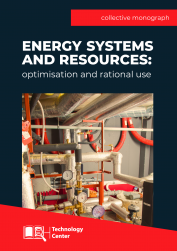Technological aspects of producing refuse derived fuel
Keywords:
Silicon, magnetic field, doping, crystal lattice defects, solar concentrators, alternative energy, production automation, municipal solid waste, refuse-derived fuel, thermal decomposition, energy efficiency, co-firing, biomass, greenhouse gas emissions, energy balance, convective drying, environmental safety, crystalline structure, phase transformations, computer modelingAbstract
The involvement of municipal solid waste in the energy balance of Ukraine is one of the important ways of replacing fossil fuels and solving environmental problems related to the disposal of waste in proving ground and landfills. The purpose of the research is to find a rational composition of an alternative solid fuel for burning in cogeneration power plants and an energy-efficient technology for its production. The object of research is alternative solid fuel (RDF- refuse derived fuel) based on combustible components of municipal solid waste.
The kinetics of convective drying of RDF of different composition depending on the temperature and rate of heat carrier was investigated. The relative and kinetic coefficients of drying, generalized drying rates for each drying period and the calculated duration of the drying process for different compositions of RDF were determined.
The thermal decomposition of various refuse derived fuel mixtures was investigated using thermal analysis methods. Temperatures of dehydration, thermal decomposition of organic and mineral substances are determined. Data were obtained on the content of water, organic and mineral substances, and ash in RDF of various composition. The rates of thermal destruction in different phases of heating were calculated, the kinetics of decomposition and heat generation during the thermal decomposition of organic substances were compared. The calorific value of RDF of different composition was determined by the method of calorimetry.

ENERGY SYSTEMS AND RESOURCES: OPTIMISATION AND RATIONAL USE
Downloads
Pages
Published
Categories
License

This work is licensed under a Creative Commons Attribution-NonCommercial-NoDerivatives 4.0 International License.

